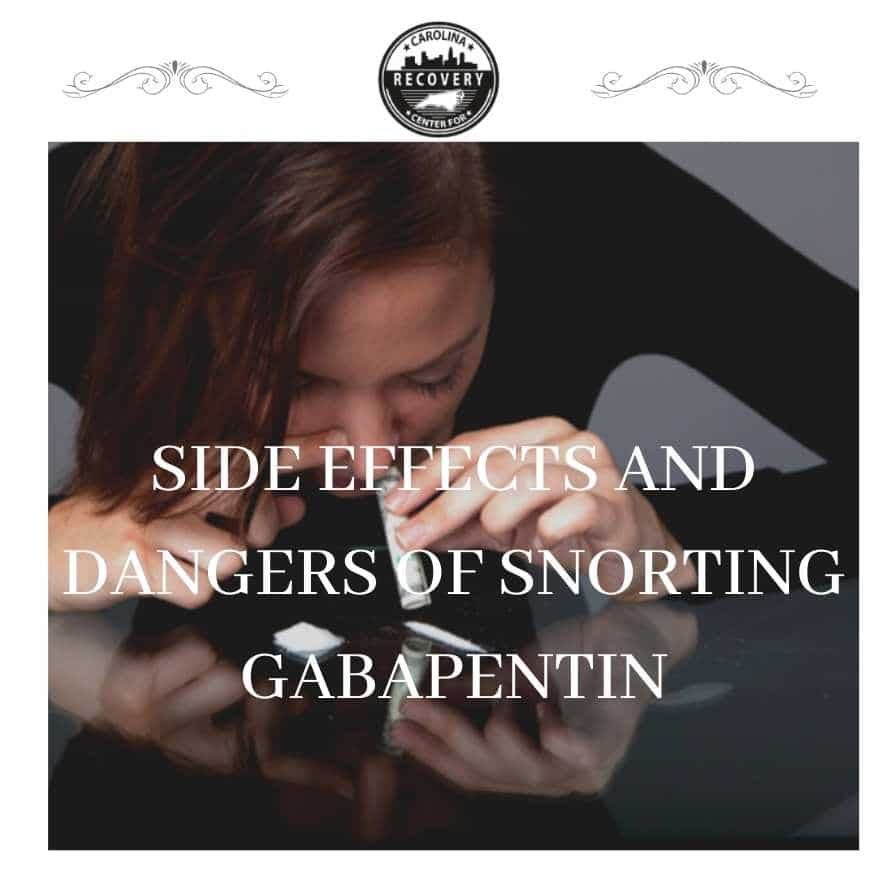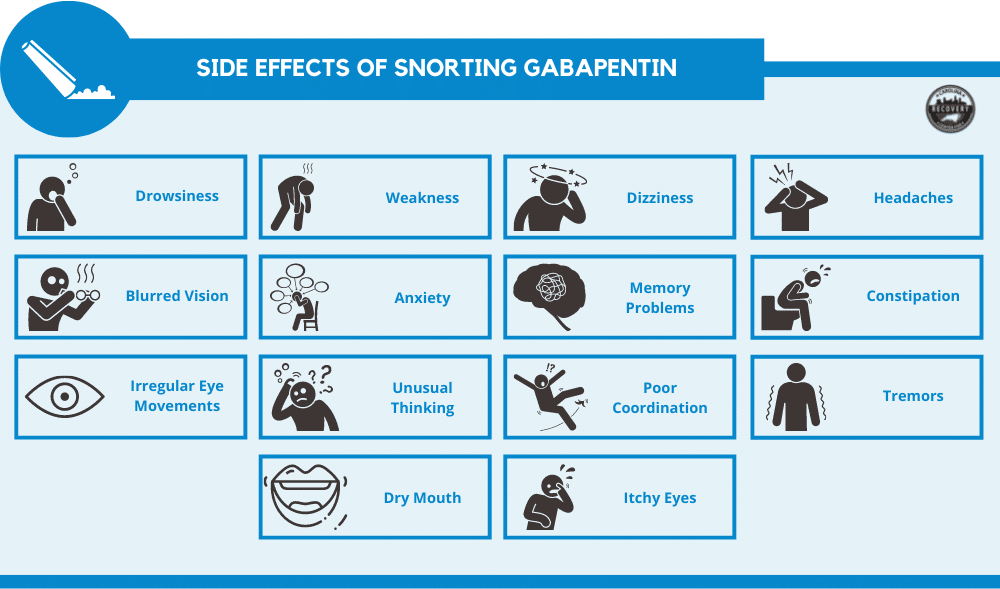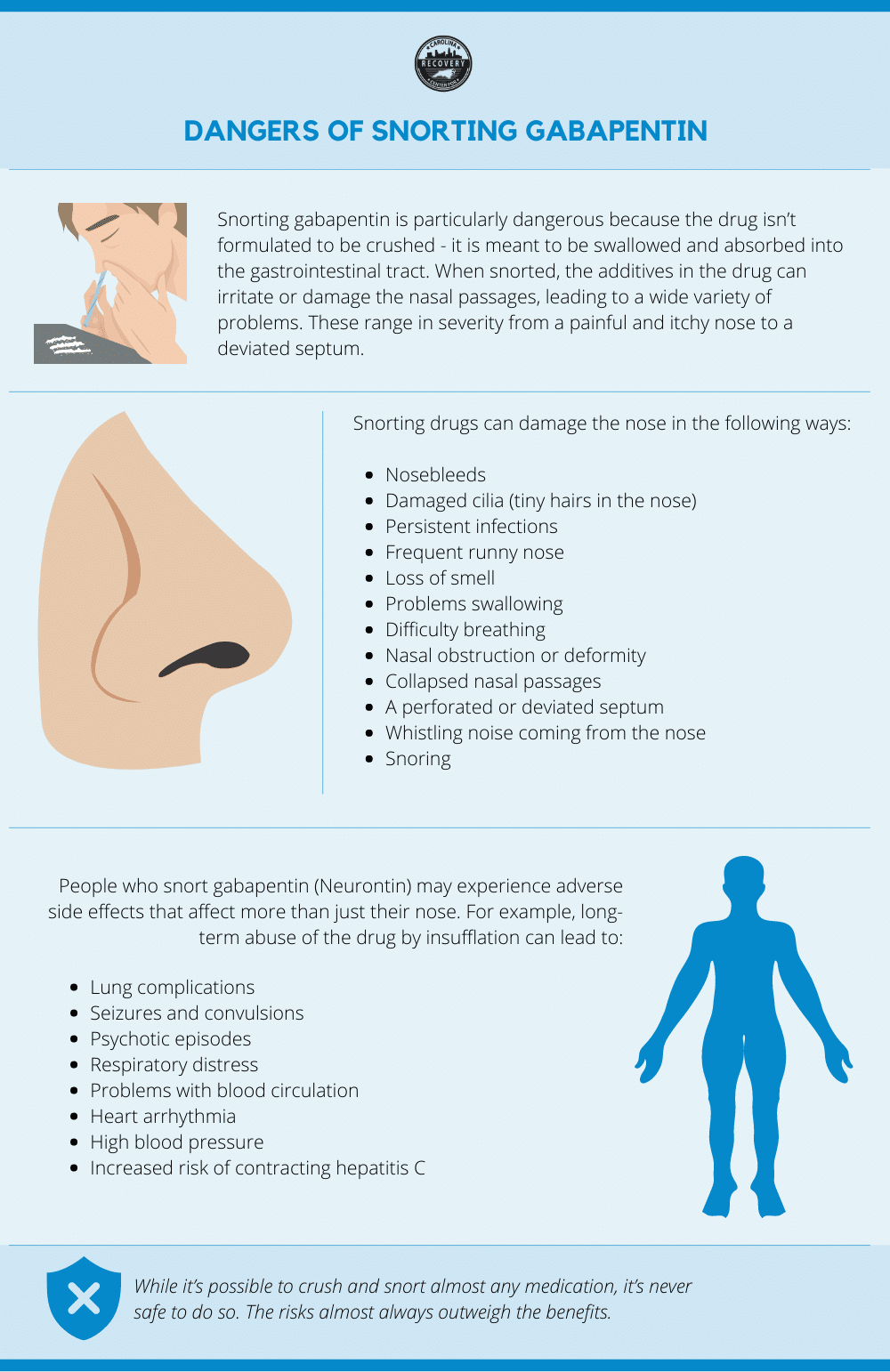Side Effects and Dangers of Snorting Gabapentin

Medically Verified: 2/1/24
Medical Reviewer
Chief Editor

All of the information on this page has been reviewed and verified by a certified addiction professional.
Is Snorting Gabapentin Safe?
Gabapentin, the generic name for Neurontin, is a prescription medication that is used to treat neuropathic pain, nerve pain, epilepsy, hot flashes, restless leg syndrome, and more. The medication functions as a mild tranquilizer that can produce euphoric effects when taken in high doses. While the medication is meant to be swallowed whole, snorting gabapentin is a popular method of consumption among drug users.
Since it’s release on the United States market in 1993, gabapentin has been presumed to have little to no abuse potential. As a result, doctors and physicians often prescribe this medication for off-label use. However, studies show that this conception of gabapentin isn’t completely accurate. In fact, there have been increasing reports of gabapentin abuse throughout the years.[1]
Even though it is not a controlled substance, gabapentin abuse can be dangerous, addictive, and life-threatening. Additionally, people who snort the drug or combine it with other drugs may be at an increased risk of addiction and severe side effects compared to those who take the medication as advised by their doctor.
Understanding Gabapentin Abuse
Overall, gabapentin (Neurontin) is abused far less than other drugs, such as opioids and benzodiazepines. However, it’s estimated that approximately 1% of the global population has misused the drug and between 40-65% of people with gabapentin prescriptions have abused it. Studies also show that people who abuse opioids may be more likely to abuse gabapentin as well, with 15-22% of opioid users also using gabapentin.[1]
The medication is involved with the GABA neurotransmitters in the brain, the same neurotransmitters affected by benzodiazepines. As such, the drug slows down the central nervous system. However, gabapentin does not affect GABA in the same way.
Gabapentin doesn’t bind to GABA receptors, but it does increase levels of GABA and decrease levels of glutamate which changes the way the body responds to pain. In high doses, this can produce a high that is similar to that produced by marijuana.
The most popular way to abuse gabapentin is by mixing it with alcohol, opioids, or benzodiazepines to increase the effects of the other intoxicant. Some people abuse the drug by taking a high dose of it, crushing and snorting it, or injecting it. No matter what way the drug is abused, long-term gabapentin abuse can lead to the development of tolerance, physical dependence, and addiction.
Can You Snort Gabapentin (Neurontin)?
If someone abuses gabapentin for an extended period of time, they may develop a tolerance. Tolerance occurs when a person needs to consistently increase their dose in order to achieve the effects they are chasing.
When tolerance develops, drug users may use more of the drug or seek alternative ways to ingest the drug to make the effects more powerful. This is one of the main reasons why people snort gabapentin.
Snorting gabapentin causes the effects of the drug to occur within minutes because intranasal drug use may increase the absorption rate and bioavailability of the drug.[2] Rather than having to wait for the pill to move through the digestive tract, insufflation brings the substance directly through the nasal tissue and into the bloodstream. This is what makes snorting substances in general so appealing to drug users.
Not only does snorting substances like gabapentin produce a faster high, but the effects experienced are also often intensified. Since the high is stronger and sets in faster when snorted, insufflation can also make gabapentin more addictive as users will develop a psychological dependence faster. People who crush and snort gabapentin are also more susceptible to adverse effects and overdose.
Side Effects and Dangers of Snorting Gabapentin
Whether a person snorts, smokes, injects, or swallows gabapentin, there are many side effects that may occur after abusing the drug. These include:[3]

- Drowsiness or sedation
- Weakness
- Dizziness
- Headache
- Blurred vision or double vision
- Anxiety
- Memory problems
- Constipation
- Unwanted eye movements
- Unusual thinking
- Poor coordination
- Uncontrollable shaking
- Dry mouth
- Red or itchy eyes

Snorting gabapentin is particularly dangerous because the drug isn’t formulated to be crushed – it is meant to be swallowed and absorbed into the gastrointestinal tract. When snorted, the additives in the drug can irritate or damage the nasal passages, leading to a wide variety of problems. These range in severity from a painful and itchy nose to a deviated septum.
Snorting drugs can damage the nose in the following ways:[4]
- Nosebleeds
- Damaged cilia (tiny hairs in the nose)
- Persistent infections
- Frequent runny nose
- Loss of smell
- Problems swallowing
- Difficulty breathing
- Nasal obstruction or deformity
- Collapsed nasal passages
- A perforated or deviated septum
- Whistling noise coming from the nose
- Snoring
People who snort gabapentin (Neurontin) may experience adverse side effects that affect more than just their nose. For example, long-term abuse of the drug by insufflation can lead to:
- Lung complications
- Seizures and convulsions
- Psychotic episodes
- Respiratory distress
- Problems with blood circulation
- Heart arrhythmia
- High blood pressure
- Increased risk of contracting hepatitis C
While it’s possible to crush and snort almost any medication, it’s never safe to do so. The risks almost always outweigh the benefits.
Signs of Gabapentin Abuse and Addiction
Not everyone who snorts gabapentin is addicted to it, but long-term gabapentin abuse can lead to addiction, and snorting drugs makes people more susceptible to addiction. Drug addiction is a condition that has many broad symptoms as well as a few symptoms that are specific to prescription drug addiction. If someone is snorting gabapentin and showing several of the following symptoms, they may be addicted.
- Going to multiple doctors in an attempt to seek out multiple prescriptions or extra doses (doctor shopping)
- Lying to friends and family about drug use
- Continually acting as though they are under the influence of gabapentin
- Attempting to stop using but being unable to do so
- Developing an increasing tolerance for the drug
- Experiencing withdrawal symptoms when not using the drug
- Struggling with persistent thoughts, urges, or cravings
- Mixing gabapentin with other substances and needing to use those substances to function
- Having drug paraphernalia in the home (razor blades, straws, crushed pill residue)
- Refusing to quit using the drug despite conflict at school, home, or work
- Continuing to use the drug despite adverse effects on one’s mental health

While the majority of withdrawal symptoms are not life-threatening, seizures and suicidal thoughts certainly can be. As a result, anyone who is dependent on or addicted to gabapentin should consult with their doctor or seek a medical detox center before stopping the drug.
Find Addiction Treatment Today
It is vital that anyone struggling with gabapentin addiction seeks help as soon as possible. Whether they are swallowing, snorting, or injecting gabapentin, addiction is a deadly and vicious disease that requires professional treatment.
At Carolina Center for Recovery, we offer comprehensive and evidence-based drug and alcohol treatment in North Carolina. With a full range of substance abuse treatment services including detox, residential, and outpatient, we help people obtain the help they deserve. Call us now to get started.
References:

